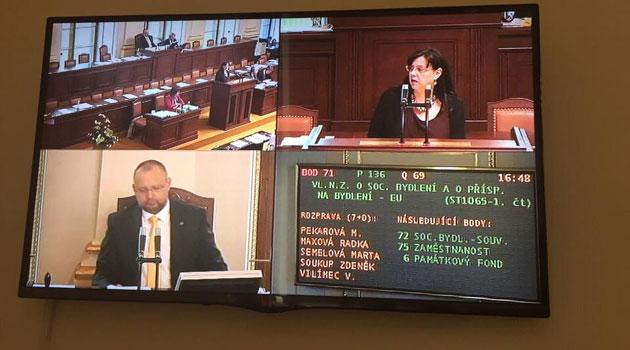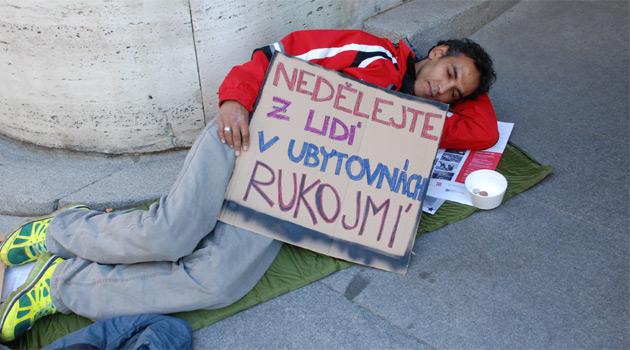Czech lower house has only just begun reviewing the social housing bill, its chances of approval before the elections keep falling

The social housing bill drafted by the Czech Labor and Social Affairs Ministry under Michaela Marksová (Czech Social Democratic Party – ČSSD) and approved by the Government faced almost nothing but criticism in the Czech Chamber of Deputies on 11 April. The right-wing opposition has called it an unusable mockery.
Even the governing coalition parties disagree about the law. Czech MPs began the first reading without completing it.
The chance that the legislation will be adopted before the autumn elections has therefore been reduced. It is not clear when the lower house intends to continue with the first reading.
“We did our best to arrive at a compromise and to introduce the kind of system that has already been adopted by other civilized countries,” Marksová said in defense of the bill. She added that she believes only those who make money on trafficking in poverty have reason to fear it.
Critics of the law, however, point out that they believe it will have an impact on a broad circle of people that will cost the state billions of crowns. According to Czech MP Markéta Pekarová Adamová (TOP 09), almost 5 % of the population would be entitled to social housing under the legislation.
“The financing issue is not at all resolved by this bill, people will be attracted into the system and then nothing would ever force them to leave it,” warned her party colleague and rapporteur Jitka Chalánková. According to the judgment of Czech MP Vladislav Vilímec (ODS), the Czech Republic may not even need the law in the form submitted.
“We are discussing something that we know full well will never be adopted,” Vilímec said. Czech MP Radka Maxová (ANO) also familiarized the lower chamber with the critical stance of Czech Regional Development Minister Karla Šlechtová (for ANO) on the bill.
Maxová reported, for example, that previous conceptual comments on the bill have not been settled yet. “The broadly-conceived target group involves the risk that people will behave in such a way that they can be assigned to the system,” Maxová read from the Regional Development Minister’s statement.
Only Czech MP Marta Semelová (Communist Party of Bohemia and Moravia – KSČM) backed the essence of the bill. “Getting an apartment is, for a big proportion of our fellow citizens, an unsolvable puzzle,” she noted.
The ANO movement and Social Democrats did not manage to convince the lower house to continue the first reading into an evening session so it could conclude that same day. Czech MP František Laudát (TOP 09), moreover, called for “an end to this undignified show” when even Marksová was no longer in the chamber.
“This is the height of irresponsibility,” muttered Maxová from the speakers’ podium when the chair of the session, Czech MP Vojtěch Filip (KSČM), had to briefly interrupt the debate because nobody from the cabinet was even in the room. The “Mít svůj domov” (“Have a Home”) initiative commented on the developments on its Facebook profile as follows: “The session in the Chamber of Deputies has now closed without voting on whether the draft Social Housing Act should move to a second reading. The MPs are going home. The chair of the ČSSD club, Czech MP Sklenák, attempted twice and failed to extend the session beyond 19:00. It is not at all clear when it will be possible to continue discussing the bill, it could take weeks. For the law to have a chance, it must make it through the first reading at the very latest during the week after 20 April. The discussion of social housing legislation, for the time being, is still continuing without results after 14 years.”
According to the bill, people should receive social apartments who have been living either in an institution, a residential hotel, or a shelter for six months. Others eligible are those who expend more than two-fifths of their income for adequate housing and are then left with resources equivalent to less than 1.6 times the minimum cost of living.
If the law is adopted before the autumn elections, the first people living in adversity would be able to apply for a social apartment from the authorities in mid-2018. After applying, those people would then be able to actually get into a social apartment by mid-2020 at the latest.
Two kinds of social apartments would exist, those involving social worker support and those not offering such assistance. Municipalities would be able to voluntarily decide whether to administer social housing or not.
If a town hall decided not to administer any social apartments on its territory, such housing would instead be provided by the State Fund for Housing Development. That state agency would have three years from the time a candidate applied to award a social apartment unit.
